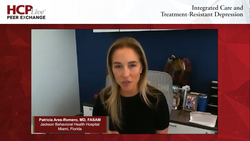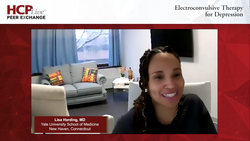Evolving Management Strategies for Treatment-Resistant Depression - Episode 2
IV Ketamine for Treatment-Resistant Depression
The rationale for treating treatment-resistant depression and other psychiatric conditions with off-label intravenous ketamine.
Steven Levine, MD: We’ve established that there are high rates of treatment-resistant depression and the need for new approaches. Why don’t we talk about other mechanistic targets? Lisa, would you like to discuss the drugs that target the glutamatergic system?
Lisa Harding, MD: Yes, thank you. The first 1 that comes to mind is ketamine, which has been around for a really long time. There was a big paper published in 2016 that talked about the 50 years of modulation of the mind where ketamine is concerned. We know that ketamine has a really high affinity for the phencyclidine site, specifically the NMDA receptor. With its antagonism of these fast-spiking GABAergic interneurons and inhibiting them, you consequently get this glutamatergic surge. Further down the line in that cascade, we get an increase in BDNF [brain-derived neurotrophic factor], and then further down, we get rapamycin. The mechanism of action and comparing it with the biogenic amine model is completely new and fascinating, for not only science but our patients. When you talk about a drug that can increase synaptogenesis, that’s amazing science and an amazing chance for our patients to get better.
Steven Levine, MD: Yes, I agree. Given that excitement around this new model of the pathogenesis of depression and the glutamatergic system as a target, we’ve seen the rapid rise in popularity of the off-label use of IV [intravenous] ketamine in clinical practice around the country, especially over the past decade. Could you comment on that?
Lisa Harding, MD: Yes. A paper was just published in The American Journal of Psychiatry looking at a review of IV ketamine and esketamine. My disclosure is that, in my private practice, I use IV ketamine and esketamine. The first thing I can assure you is that I’m blown away by the rapid onset of alleviation of suffering for my patients. That’s what I want anybody watching to take away from this. Most of the clinical trials show that with 1 dose, there’s a 50% reduction in MADRS [Montgomery-Asberg Depression Rating Scale] score—though not sustained, which is why we have multiple treatments. Judicious administration of ketamine to our patients is life changing.
Steven Levine, MD: Thank you for watching this HCPLive® Peer Exchange. If you enjoyed the content, please subscribe to our e-newsletters to receive upcoming Peer Exchanges and other great content right in your in-box.
Transcript Edited for Clarity



